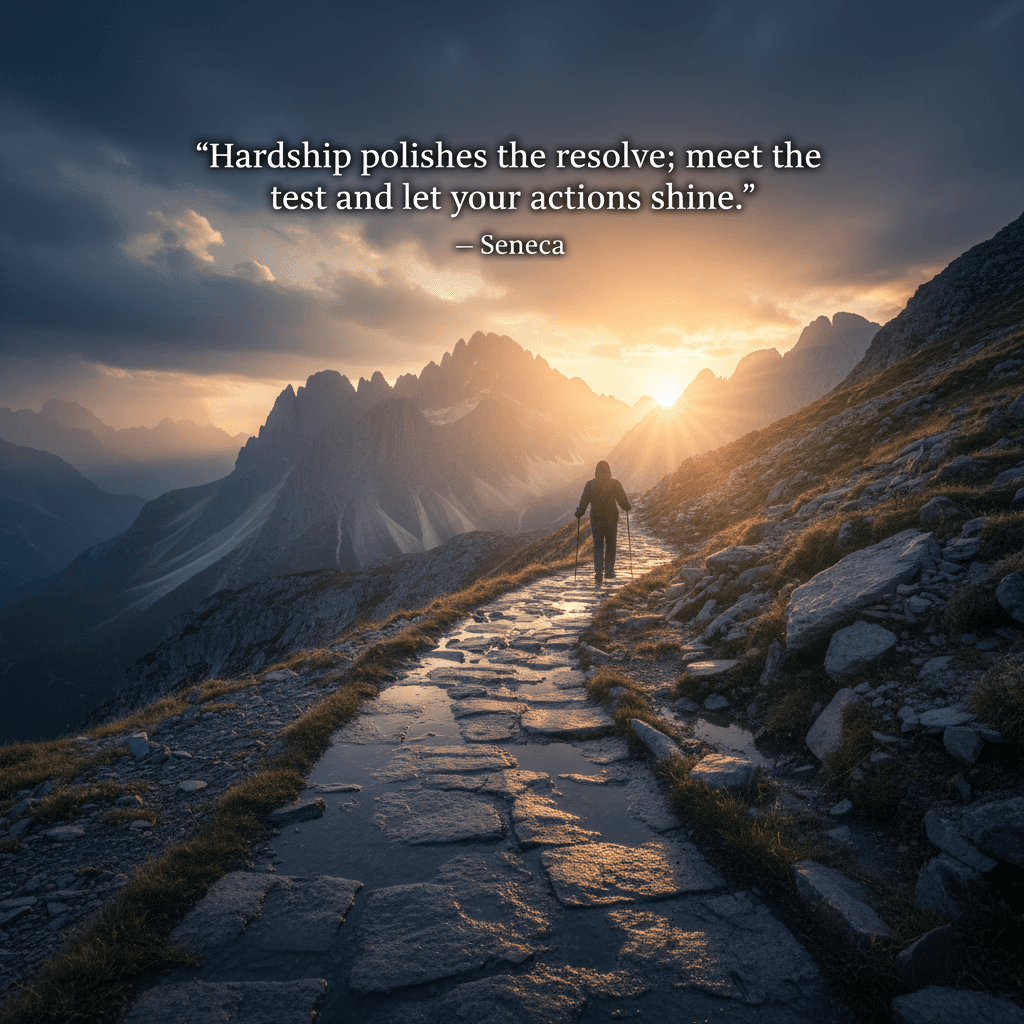Adversity Refines Character; Let Deeds Illuminate Virtue

Hardship polishes the resolve; meet the test and let your actions shine. — Seneca
The Stoic Alchemy of Hardship
Seneca’s line distills a Stoic conviction: adversity abrades the rough ore of intention until resolve gleams. In On Providence (c. 62 CE), he frames trials as a crucible—“fire tests gold; misfortune tests brave men”—arguing that obstacles are not detours but the road itself. Thus, hardship is not a cosmic mistake; it is the medium through which courage, patience, and temperance are brought to a polish. Crucially, this does not romanticize suffering; it clarifies its function. Comfort can conceal weaknesses, but friction reveals the grain of character, making visible what calm seas never show.
From Principle to Performance
Accordingly, the exhortation to “meet the test” pivots us from speculation to conduct. Seneca’s Letters to Lucilius repeatedly insist that philosophy must be legible in one’s schedule, speech, and service; a creed unperformed is a costume. Resolve is proven not in what we plan to do but in what we do under pressure—when the easier path beckons and we walk the harder one. In this way, doctrine becomes discipline, and ideals harden into habits that hold when life presses back.
History’s Proving Ground
This ethic takes on flesh in Marcus Aurelius, who governed during the Antonine Plague. Meditations (c. 170 CE) records no self-pity; instead, it rehearses duty, gratitude, and cooperation: begin the day expecting disruptions, yet choose to act for the common good. Rather than being diminished by crisis, his role expanded through it, demonstrating that leadership under strain shines by calm decisions, steady justice, and care for the whole. Thus the Stoic claim moves from aphorism to exemplar, showing how inner resolve can steady an entire polity.
Psychology of Being Tempered
Modern research subtly echoes the ancients. Tedeschi and Calhoun (1996) describe post‑traumatic growth—gains in appreciation, relationships, and priorities—when adversity is appraised as meaningful and met with deliberate coping. Likewise, cognitive reappraisal equips people to reinterpret stress as challenge rather than threat, preserving focus and energy. Even broader, Taleb’s Antifragile (2012) argues that some systems improve with shocks. Yet growth is not guaranteed; it depends on mindset (Dweck, 2006), social support, and purposeful action. Thus the “polish” appears when pain is processed, not merely endured.
Practices That Polish Resolve
To make this actionable, Stoics trained before the storm. Premeditatio malorum—vividly anticipating setbacks—reduces surprise and readies response (Seneca, Letters). Musonius Rufus recommended voluntary discomfort—simple food, plain clothes—to rehearse sufficiency. Today, implementation intentions operationalize resolve: “If X obstacle arises, then I will do Y” (Gollwitzer, 1999). A daily “virtue ledger”—briefly noting where one fell short and how to repair it—turns remorse into refinement. Through such drills, we engineer conditions in which, when tests arrive, action shines without fanfare.
Shining Beyond the Self
Moreover, Seneca’s closing charge is civic: let your actions be light for others. The Stoic cosmopolis casts each person as a citizen whose conduct can steady a wider circle (Marcus, Meditations 6.44). In crises, example is a public good: a nurse’s steady presence, a manager’s truthful briefing, a neighbor’s organized aid. Deeds travel farther than declarations, creating a contagion of courage that outpaces fear. Thus, personal polish becomes communal illumination.
Strength With Mercy and Justice
Yet not all hardship ennobles; some harms disable or stem from injustice. Stoicism does not mandate passive endurance of preventable suffering. Epictetus distinguishes what is within our control and directs us to act justly on the rest (Enchiridion 1), while Seneca’s On Clemency counsels humane governance. Therefore, meeting the test includes resisting wrongful conditions and aiding the vulnerable. In this balance—inner steadiness paired with outward mercy—our actions shine without blinding, and resolve is tempered to serve the common good.